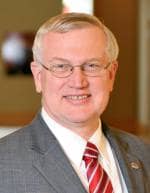
John E. Tomaszewski, MD, FASCP
John E. Tomaszewski, MD, FASCP, is president of the American Society for Clinical Pathology (ASCP), Chicago, and chair designate of the Department of Pathology and Anatomical Science at The State University of New York at Buffalo. He served for 28 years at the University of Pennsylvania as professor of pathology and laboratory medicine, and in numerous leadership capacities including director of Electron Microscopy, director of Surgical Pathology, and vice chair of Anatomic Pathology-Hospital Services and interim chair of Pathology and Laboratory Medicine. He talks with CLP about how the Centers for Medicare & Medicaid Services’ (CMS) proposed accountable care organization (ACO) program could affect lab professionals.
CLP: Why is it important for lab professionals to keep ACOs on their radar?
Tomaszewski: With laboratory tests serving as the basis for up to 70% of a patient’s medical profile, pathologists and laboratory professionals need to be included in described accountable care organizations.
CLP: Tell us about CMS’ proposed ACO program, and how it aims to enhance patient care while cutting overall costs.
Tomaszewski: The proposed ACO program creates a new type of health care payment and delivery system, which links reimbursement for services into specific, measurable goals and quality improvements. ACOs are provider-led organizations with a strong base of primary care that are collectively accountable for quality and total per capita costs across the full continuum of care for a population of patients; incentive payments linked to specific quality and performance metrics that may also reduce overall costs; and reliable and progressively more sophisticated performance measurement, to support improvement and provide confidence that savings are achieved through improvements in care.
CLP: In a perfect world, what role would clinical lab professionals/pathologists play on the ACO team?
Tomaszewski: Under the ACO framework, pathology and laboratory medicine may take on increasingly important roles due to the importance of laboratory data in the diagnosis and treatment of disease. As a core member of the ACO, pathology and laboratory medicine can help reduce the cost of unnecessary testing and improve quality by ensuring that patients receive the appropriate laboratory tests. Moreover, with genetic and genomic testing menus ever expanding, there will be an increasing need for more consultations between clinicians and pathology and laboratory medicine, and the ACO framework seems poised to enable this.
CLP: What role will clinical lab professionals and pathologists play on the ACO team as molecular diagnostics and personalized medicine become more established and widespread?
Tomaszewski: In the future, rapid advances and increasing complexity of genomic and genetic testing means that clinicians will increasingly need to seek guidance from pathologists and other appropriately trained laboratory medicine experts to properly diagnose and provide treatment regimens for their patients. In the next 5 years, thousands of genetic tests are expected to be developed, and without the experienced consultation of pathologists and PhD-level clinical scientists, patients will not receive optimum care, which, in turn, will create even more burden on the health care system.
CLP: Could you suggest an effective strategy for lab managers approaching physicians and advising that fewer or different tests should be performed?
Tomaszewski: Laboratory managers working within an ACO should work with their laboratory director on how best to coordinate with clinicians about necessary testing.
CLP: Is the ACO proposal, as it stands now, too vague to fully engage pathologists and other clinical lab professionals in accomplishing CMS’s aims?
Tomaszewski: As the goal of these organizations is to help cut costs to the health care system and American patients, ASCP supports the goals of the proposal, but asserts that the lack of clarity as it pertains to pathologists and PhD-level clinical scientists undermines the program’s ability to achieve its goals.
CLP: What specific wording should the final regulation include, so pathologists and PhD-level clinical scientists are clearly demonstrated as partners in helping cut costs?
Tomaszewski: Ideally, the final rule would change the definition of an eligible entity to specifically include pathologists and PhD-level clinical scientists. That said, the rule, as currently written, allows ACOs to include pathologists but does not mandate their inclusion.
CLP: Tell us how the ACO program’s current language in regard to self-referrals needs to be changed to rein in potential excesses in patient testing.
Tomaszewski: Regarding self-referrals, ASCP understands the need for waivers in some situations, but the Society urges CMS to limit waivers and not allow physicians to directly benefit from their referrals. Instead, relief provided from federal and state antitrust laws and physician self-referral laws should be limited to ACOs that are true multispecialty organizations capable of providing a full spectrum of patient care.
CLP: Will an entity that advocates on behalf of pathologists and laboratorians advocate to try to ensure the loopholes are closed? Are these efforts under way?
Tomaszewski: Yes, ASCP, along with our colleagues at the College of American Pathologists (CAP) and the American Clinical Laboratories Association (ACLA) are working together to close these loopholes. In addition, ASCP, CAP, and ACLA have teamed up with representatives of other groups adversely affected by self-referral, such as radiologists, radiation oncologists, and physical therapists. We have all banded together to form the Alliance of Integrity in Medicine to put a stop to inappropriate self-referral.
Judy O’Rourke is editor of CLP.



